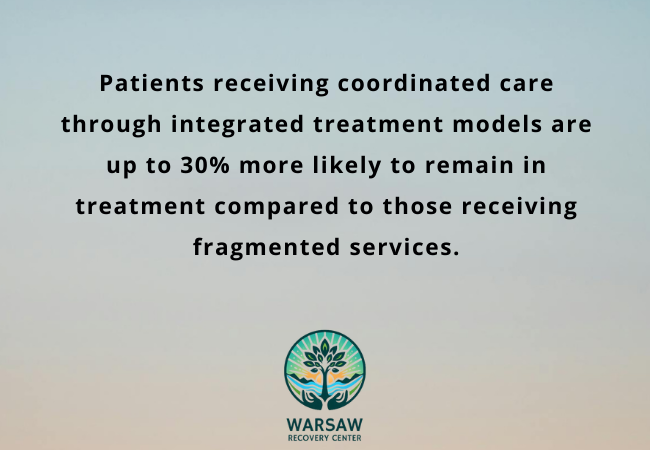When it comes to overcoming substance use and co-occurring mental health disorders, success requires more than individual effort—it demands a cohesive, expert-led support system. That’s why Warsaw Recovery, a leading Addiction Treatment Center in Virginia, prioritizes cross-functional treatment teams in our inpatient and residential care.
From medical detox programs in Virginia to long-term residential treatment, our multidisciplinary teams coordinate care across specialties to deliver customized, effective recovery strategies—designed for sustainable healing and real transformation.
What Is a Cross-Functional Treatment Team?
A cross-functional treatment team is an integrated group of professionals from diverse disciplines who collaborate to treat all aspects of a patient’s condition. These teams are a cornerstone of modern inpatient recovery programs and are particularly effective for individuals needing complex care.
At Warsaw Recovery, our cross-functional teams may include:
- Medical Doctors (MDs) – Overseeing detox, withdrawal management, and co-existing medical conditions.
- Psychiatrists and Psychologists – Diagnosing and treating mental health and dual diagnosis cases.
- Licensed Clinical Therapists – Leading individual, group, and trauma-informed therapy sessions.
- Nurses and Nurse Practitioners – Providing 24/7 health monitoring and medication support.
- Addiction Counselors – Offering behavioral therapy, education, and relapse prevention strategies.
- Nutritionists – Designing dietary plans to support physical and emotional recovery.
- Case Managers – Coordinating aftercare planning and discharge transitions.
- Peer Support Specialists – Offering encouragement and firsthand insight into recovery.
This team-centric model aligns with best practices for Substance Abuse Treatment in Virginia, giving each patient a comprehensive care experience.
The Power of Collaboration in Inpatient Treatment
Whole-Person Focus
Recovery is more than physical sobriety—it involves healing the brain, rebuilding emotional resilience, and regaining life skills. A collaborative team ensures these dimensions are treated concurrently. Whether it’s someone undergoing Alcohol Addiction Treatment in Virginia or struggling with methamphetamine addiction, their care is never one-dimensional.
Real-Time Adaptability
During detox and residential care, symptoms and needs can change quickly. When medical and clinical staff communicate regularly, interventions can be made immediately—minimizing risk and improving patient safety.
For example, during benzodiazepine addiction treatment in Virginia, sudden withdrawal symptoms require close collaboration between physicians, nurses, and therapists to safely stabilize the client while maintaining emotional support.
Enhanced Patient Engagement
Clients in inpatient settings often feel overwhelmed. Knowing that a compassionate, expert team is working together boosts their trust, participation, and motivation. Cross-functional teams don’t just deliver services—they create a circle of accountability, empathy, and empowerment.
Dual Diagnosis—Where Integrated Teams Shine
Dual diagnosis—when an individual struggles with both substance use and a mental health disorder—is more common than many realize. According to SAMHSA, nearly 50% of people with a substance use disorder also have a co-occurring mental illness.
At Warsaw Recovery, our cross-functional teams are equipped to:
- Diagnose co-occurring disorders accurately
- Coordinate psychiatric care alongside detox
- Balance medication management with therapy
- Align addiction treatment goals with mental health stabilization
For individuals navigating dual diagnosis within our inpatient treatment programs in Virginia, cross-disciplinary teamwork is essential—not optional.
The Role of Each Team Member in Recovery
Medical Providers
Lead detox efforts, oversee medication-assisted treatment (MAT), and address underlying health issues. Their decisions often influence the course of the entire care plan.
Therapists and Counselors
Deliver trauma-informed cognitive behavioral therapy (CBT), dialectical behavior therapy (DBT), and motivational interviewing to help clients confront root causes and change behavior.
Nursing Staff
Serve as the backbone of 24-hour monitoring and emotional reassurance. They also administer medications and track health metrics that influence daily treatment decisions.
Nutrition and Wellness Staff
Physical health and emotional stability go hand in hand. Proper nutrition supports brain health, improves sleep, and enhances energy—critical during early recovery.
Case Managers
Coordinate discharge, set up outpatient programs, and ensure smooth transitions to sober living or Intensive Outpatient Programs in Virginia.
How Cross-Functional Teams Influence Specific Treatment Paths
In Alcohol Addiction Treatment
Withdrawal can be dangerous. Doctors and nurses lead stabilization while therapists help manage cravings, triggers, and co-occurring depression or anxiety. Nutritionists step in to address deficiencies caused by long-term alcohol use.
In Benzodiazepine Addiction Treatment
Due to the risk of seizures or psychosis during withdrawal, a medically supervised detox is crucial. Psychiatrists may prescribe tapering schedules while therapists help rebuild emotional regulation skills.
In Methamphetamine Addiction Treatment
While meth withdrawal may not always require medical detox, the psychological impact—paranoia, depression, insomnia—is profound. Cross-functional teams address these symptoms through psychiatric support, sleep hygiene strategies, and cognitive therapy.
Real-Life Applications—A Day Inside the Treatment Team
What does cross-functional teamwork look like in action?
At Warsaw Recovery, here’s how a typical day might unfold for a client undergoing treatment:
-
7:00 AM – The nursing staff performs morning wellness checks and administers medications.
-
9:00 AM – The client meets one-on-one with their therapist to process a triggering event.
-
11:00 AM – The case manager schedules a family therapy session for later in the week and checks in on progress toward discharge goals.
-
1:00 PM – A psychiatrist adjusts the client’s medication dosage based on input from both nursing and counseling staff.
-
3:00 PM – The clinical team meets for a collaborative review of all client cases, updating care plans based on emerging patterns or new challenges.
-
5:00 PM – The client participates in a group therapy session facilitated by a licensed addiction counselor.
This coordinated rhythm creates a therapeutic environment where nothing is left to chance. Every step is informed by shared insight and unified goals.
How Clients Benefit Emotionally from Integrated Teams
Healing from addiction isn’t only about medical protocols or therapy techniques—it’s also about feeling seen, supported, and safe. Cross-functional treatment teams at Warsaw Recovery help foster:
-
Trust – Clients know they’re not being passed from one department to another without coordination.
-
Security – Medical and emotional needs are addressed simultaneously, reducing feelings of anxiety or neglect.
-
Empowerment – With a well-rounded team behind them, clients are more likely to take ownership of their recovery journey.
-
Consistency – Language, goals, and expectations are consistent across all touchpoints of care, preventing confusion and fostering stability.
In short, our model not only treats addiction—it improves the treatment experience, leading to greater emotional investment and more meaningful progress.
Innovation in Team-Based Treatment—Leveraging Technology
At Warsaw Recovery, we embrace technology to make our cross-functional care model more efficient and effective. Here’s how:
-
Shared Electronic Health Records (EHRs) – Every team member has real-time access to client progress notes, medication logs, and behavioral updates.
-
Virtual Team Conferences – Remote specialists, such as trauma consultants or psychiatric advisors, can join integrated care meetings via secure video.
-
Digital Aftercare Planning – Case managers can coordinate outpatient services and referrals electronically, with patient input, to ensure seamless transitions.
These innovations allow us to keep care connected, confidential, and client-centered, even in fast-moving or high-need scenarios like detox or early recovery.
Involving Families in the Team Approach
Addiction affects more than the individual—it impacts the entire family system. That’s why we include family involvement as part of our integrated care approach.
Our treatment team may invite loved ones to participate in:
-
Family therapy sessions with licensed counselors
-
Education workshops about addiction, relapse warning signs, and codependency
-
Discharge planning and outpatient referrals that involve the family in recovery goals
Including families strengthens the support network surrounding each client. It also helps loved ones understand how to foster healing at home—especially during the critical transition from inpatient care to independent living or outpatient support.
Data-Driven Results from Integrated Team Care
National data supports the effectiveness of team-based inpatient care:
- The Journal of Substance Abuse Treatment found that integrated treatment teams resulted in 30% higher retention rates in residential programs.
- According to NIDA, coordinated care reduces the risk of relapse by up to 40% compared to fragmented treatment approaches.
- Programs using cross-functional models report a 60% improvement in patient satisfaction and aftercare engagement.
These figures validate what we see at Warsaw Recovery every day—when experts work together, clients succeed.
Beyond Treatment—Planning for the Future
One of the most valuable aspects of our cross-functional model is how it prepares patients for life after inpatient care. Our teams collaborate to build:
- Personalized Aftercare Plans – Tailored to each client’s risks and goals.
- Sober Living Referrals – Helping clients maintain structure post-discharge.
- Outpatient Program Transitions – Seamlessly connecting clients to our PHP or Intensive Outpatient Program in Virginia.
- Ongoing Mental Health Support – Through therapy, telehealth, and community resources.
This continuity significantly reduces the chances of relapse and supports long-term independence.
Why Warsaw Recovery Leads with Team-Based Care
Not every addiction treatment center in Virginia offers true cross-functional care. At Warsaw Recovery, it’s our foundation.
We offer:
- Medically monitored detox for all substances
- Specialized tracks for alcohol, benzos, meth, and dual diagnosis
- Trauma-informed care in a safe, supportive residential setting
- Collaborative care plans updated in real-time
- Seamless transitions to outpatient and community support programs
We treat clients as whole individuals—not just as diagnoses. That means wrapping each one in a network of medical, emotional, psychological, and logistical support.
Conclusion
Addiction is complex—but with the right support system, healing is absolutely possible. At Warsaw Recovery, our cross-functional treatment teams don’t just help you detox—they help you rebuild your life.
Whether you’re facing alcohol use disorder, benzodiazepine dependency, methamphetamine addiction, or co-occurring mental health challenges, you deserve a team that works together to put you first. Call Warsaw Recovery today at 888.511.9480 to speak confidentially with an admissions specialist and learn how our inpatient treatment programs in Virginia can guide you toward lasting sobriety.
FAQs on Cross-Functional Teams in Addiction Recovery
How does a cross-functional team differ from traditional rehab care?
Traditional rehab models often separate care by department. Cross-functional teams break down those barriers by working collaboratively in real time to meet the patient’s changing needs.
Do all inpatient programs offer this kind of care?
Not necessarily. At Warsaw Recovery, we specialize in this integrated model, but not all treatment centers have the resources or staff to support it fully.
Is this team approach available during detox?
Yes. Our Medical Detox Program in Virginia is staffed by a multidisciplinary team from the moment you arrive, ensuring your safety and comfort through each phase.
How does this model help with long-term recovery?
Integrated teams plan for aftercare from day one. They coordinate therapy, relapse prevention, medication management, and community support—laying a solid foundation for long-term success.
Can I stay connected with my team after inpatient care?
Our case managers and outpatient programs ensure continued access to therapy and follow-up care. Continuity is part of what makes our outcomes so strong.


